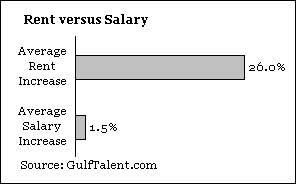Faced with substantially higher rents for residential accommodation, over half of all senior executives in the UAE are planning to demand a pay increase or switch to another employer, according to results of a survey conducted by GulfTalent.com.
The survey found that while rents this year were on average 26% higher than the previous year, average salaries had only risen by 1.5% in the same period, causing a substantial shortfall in most employees' cash flow.

According to the survey results published by GulfTalent, Dubai had the highest average rent increase at 27%, followed by Sharjah with 25% and Abu Dhabi in third place with 23%. Nationwide, rents for apartments went up by around 24%, while room rents shot up at a staggering 31%. [See full report ]
Salaries continue to stagnate, with most respondents reporting no increase in pay. Average wage increase for the country stood at 1.5%, with public sector leading the increase at 2.8%, followed by multi-nationals at 2.0% and local companies at 0.8%. Rather surprisingly, senior executives experienced a below-average increase of just 0.7%, possibly due to the increasing number of international executives now willing to relocate and work in the UAE.
When asked how they planned to deal with the increased rent pressure, responses varied significantly. 35% of all people polled by GulfTalent planned to switch employers or ask for a pay rise, while this figure for senior executives stood at 55%. Although the possibility of being banned was a concern, many were still willing to take a chance.
Commenting on these results, a spokesperson for GulfTalent.com said "Our data suggest that rent as a percentage of salary has increased from 26% to 32% this year. This represents a substantial fall in net disposable income, which may have repercussions for the rest of the economy. There is likely to be increased turnover in the job market, particularly at the senior level where candidates are more mobile. More disturbingly, we are finding that many people are having to take loans or delay their repayments in order to deal with the hike and this may lead to increasing default rates for the banking sector in the next 12 months".
Other common reactions revealed in GulfTalent's survey were to send families back home or relocate to another Emirate. About 6% of Dubai-based respondents planned to relocate to Sharjah, while 7% of those in Sharjah planned to move to neighboring Ajman. For female respondents, the most popular choice was to cut their spending, negotiate a pay rise with their employer or negotiate a discount with the landlord. Male respondents, on the other hand, would primarily switch to another employer, ask for a pay rise, or leave the UAE.
Responses also varied across Emirates. 12% of Sharjah residents planned to send their families back home, compared to an average of 5% in Dubai and Abu Dhabi. Over 24% of those working in Sharjah and Abu Dhabi planned to ask for a pay rise, compared with just 14% in Dubai, reflecting the greater bargaining power of employers based in Dubai.
